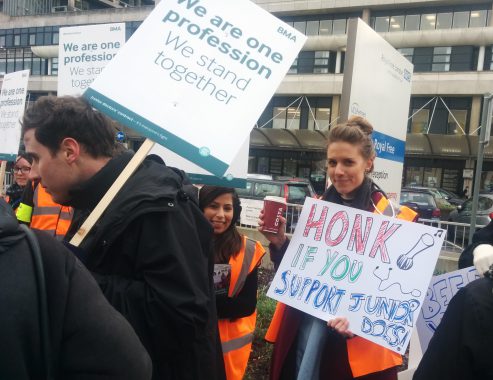The BMA and the Government have reached an agreement in the long-running junior doctor dispute, which will see trainees given enhanced payments for evening and weekend working, Acas has announced.
The agreement means that trainees who work more than one every weekend in eight will receive enhanced payments, while any shifts beginning at 8pm or later will receive 37% enhanced payment for every hour worked.
This will be subject to a vote of junior doctors who are members of the BMA, who could still throw it out.
Acas said some of the elements of the new contract, if approved, will be implemented in August, while ’all junior doctors will move on to the agreed new terms between October 2016 and August 2017’.
The statement said: ’This has now been agreed by all parties as resolving the current dispute subject to securing the support of BMA junior doctor members in a referendum.
’Work will be done together by both sides over the next two weeks to finalise the communications with BMA members on all the details of the agreement and their new contract.’
Acas chairman Sir Brendan Barber, who has led talks, said negotiators from both sides ’have worked with great intensity and in a good spirit to achieve this breakthrough’.
He said: ’This long-running dispute has clearly been an extraordinarily difficult period for the NHS. So I am glad that as well as cooperating closely in preparing the communications for the upcoming referendum, all the parties are also strongly committed to tackling together the bigger, wider challenges facing the NHS.’
Dr Johann Malawana, BMA junior doctor committee chair, said he was ’pleased to have reached agreement’.
He said: ’Junior doctors have always wanted to agree a safe and fair contract, one that recognises and values the contribution junior doctors make to the NHS, addresses the recruitment and retention crisis in parts of the NHS and provides the basis for delivering a world-class health service.
‘I believe that what has been agreed today delivers on these principles, is a good deal for junior doctors and will ensure that they can continue to deliver high-quality care for patients. This represents the best and final way of resolving the dispute and this is what I will be saying to junior doctors in the weeks leading up to the referendum on the new contract.’
Health secretary Jeremy Hunt said: ’We welcome this significant agreement which delivers important changes to the junior doctors’ contract necessary to deliver a safer seven day NHS.
’The talks have been constructive and positive and highlighted many areas outside the contract where further work is necessary to value the vital role of junior doctors and improve the training and support they are given. This deal represents a definitive step forward for patients, for doctors, and for the NHS as a whole.’
Main changes to the imposed contract
- A new rate of pay for weekend working, which will enhance payments more for more weekend worked. This will be worked out as:
| Frequency | Percentage |
|---|---|
|
1 weekend in 2
|
10% |
|
<1 weekend in 2 – 1 weekend in 4
|
7.5%
|
|
<1 weekend in 4 – 1 weekend in 5
|
6%
|
|
<1 weekend in 5 – 1 weekend in 7
|
4%
|
|
<1 weekend in 7 – 1 weekend in 8
|
3%
|
|
<1 weekend in 8
|
No weekend allowance |
- An agreement that any shift which starts at or after 8pm, lasts more than 8 hours and finishes at or by 10am the following day, should attract an enhanced pay rate of 37% for all hours worked;
- An increase in the ‘flexible pay premia’ – an incentive for short-staffed specialties – for oral and maxillofacial surgery, emergency medicine and psychiatry to £20,000 for the whole training period. GP trainees will still get a premia of £8,200 a year, as agreed before;
- A ‘guardian of safe working’ will need to be in place for GP trainees. If there are fewer than 10 GP trainees in a practice, practices must jointly appoint the guardian with similar employers or enter into a contract with a neighbouring trust;
- Accelerated learning opportunities to allow doctors who have taken time out of training to catch up;
- Pay protection when trainees switch training paths due to caring responsibilities;

















